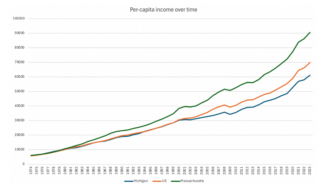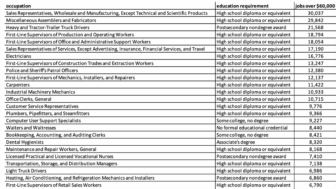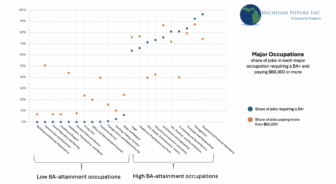
Michigan’s new Growing Michigan Together council and its workgroups have an opportunity to reverse four decades of Michigan population, employment, and household income decline. What follows is the Michigan Future Board‘s recommendations on what needs to be accomplished for creating a Michigan economy that achieves rising income for all.
Michigan was a 20th Century high-prosperity state. Now we are a 21st Century low-prosperity state. Ranking 38th in per capita income, 13 percent below the national average in 2022. The lowest Michigan has been compared to the nation ever!
The core reason for this unprecedented collapse in economic well-being is that the Michigan economy has too many low-wage jobs. A state that once attracted people from across the planet to get high-paid jobs is now a state with average wages nearly ten percent below the national average. Six in ten Michigan jobs pay less than what is required for a family of three to be middle class.
Michigan can return to high-prosperity––a place where all can pay the bills and save for their retirement and the kids’ education. But that requires a willingness to make big changes in state policy. What we have been doing to increase the economic well-being of Michiganders has not worked. A small course correction to our economic and education agendas will not be sufficient – transformational change in both is required if we are to restore Michigan to high-prosperity.
Over three decades of rigorous data analysis has taught us one fundamental lesson: This is an economy where talent attracts capital. As you can see in the table below of the top per capita income non energy extraction states, the most consistent predictor of a state’s economic success is the share of its adults – particularly young adults – with a four-year degree. Where young talent goes, high-growth, high-wage, knowledge-based enterprises follow, expand, and are created. The new path to prosperity is concentrated talent.
Michigan is a national laggard in both young talent concentration and knowledge-based enterprise concentration.
To put it simply: either Michigan gets younger and better educated or we will get poorer. Where younger means a place where Michigan is retaining those who grow up here and attracting mobile young talent from any place on the planet. And better educated primarily means increasing the proportion of adults––particularly young adults––who have a four-year degree or more.
Preparing, retaining and attracting young talent is the 21st Century economic development imperative. Do everything else that we call economic development well and don’t get younger and better educated Michigan will permanently be a low-prosperity state.
The getting younger imperatives
Talent attracts capital and quality of place attracts talent. So getting younger requires economic development policies squarely focused on creating the kinds of places where highly-educated young people want to live and work. The data show that highly-educated young people are increasingly concentrating in regions that are first and foremost transit rich and offer multiple vibrant central city neighborhoods that are high-density, high-amenity, walkable and have an active street life.
More specifically the Michigan Future Board believes the high-impact getting younger levers are:
- Being welcoming to all no matter where one is born, one’s sexual orientation, race, religion or ethnic background.
- Providing extensive transit—particularly rail transit––as the 21st Century infrastructure that matters most to retaining and attracting young talent
- Creating talent magnet neighborhoods: dense, walkable, high-amenity neighborhoods, with parks, retail, and public arts woven into residents’ daily lives.
The getting better educated imperatives
Getting better educated requires transforming Michigan schooling: both what we teach and how we teach. We need schooling where students are engaged, not bored; one where all students are developing agency to create and realize their own dreams; and one where all students develop the broad non-content and non-occupation specific skills that will enable them to keep learning and adapting in a world characterized increasingly by constant change.
To thrive in the new economy, workers have to be adaptable, have a broad base of knowledge, be creative problem-solvers and be able to communicate and work well with others. In other words, workers need to be really good at all of the non-algorithmic skills computers aren’t good at yet.
This requires moving away from schooling organized around student discipline, moving away from an emphasis on doing well on content-focused standardized tests and moving away from increasingly building first-job skills in others’ kids. It requires moving to defining collaboration, communication, content, critical thinking, creativity and confidence as the foundation skills for all students. And moving to a more rigorous and a more project-based pedagogy.
More specifically the Michigan Future Board believes the high-impact getting better educated levers are:
- Establishing communication, collaboration, content, critical thinking, creativity and confidence (the 6Cs) as the foundational career success skills for all Michigan students
- Substantially improving college completion rates––particularly B.A. attainment rates—of Michigan high school graduates of students from all backgrounds.
- Start messaging––particularly to non-affluent students––that a four-year degree is the most reliable path to a successful forty-year career. There is no racial equity or economic mobility agenda that can succeed without a substantial increase in B.A. attainment of non-affluent students.
Getting younger and better educated requires big public investment
Getting younger and better educated requires significant public investment. This is not a set of recommendations that can be done on the cheap, or by tinkering at the edges. The states that have won in the transition to the knowledge economy are those that have invested deeply and sustainably in their central cities, in world-class transit, and in their preK – 16 education systems.
If we make the tough decisions and the big investments, we can see a Michigan with a growing population, prosperous citizens from all backgrounds, and neighborhoods that rival the best in our nation.
But that future only happens with decisive action to successfully transition to the high- wage knowledge economy by investing in our young people, and creating vibrant cities that attract talent from across the globe.
If we do not, we will continue to get older and poorer, and will watch our children move to cities out of state.
| Per capita income 2022 | B.A attainment 25 and older 2021 | B.A. attainment 25-34 year old 2021 | Information industry earnings per capita 2021 | |
| Connecticut | 1 | 6 | 6 | 3 |
| Massachusetts | 2 | 1 | 1 | 2 |
| New Jersey | 3 | 4 | 2 | 6 |
| New York | 4 | 9 | 4 | 1 |
| California | 5 | 16 | 16 | 4 |
| Washington | 6 | 10 | 13 | 5 |
| New Hampshire | 7 | 8 | 8 | 9 |
| Colorado | 8 | 2 | 5 | 8 |
| Maryland | 10 | 5 | 10 | 12 |
| Illinois | 12 | 12 | 10 | 10 |
| Michigan | 38 | 32 | 30 | 30 |
The information industries are Information, Finance and Insurance, Professional and Technical Services, and Company Management.







